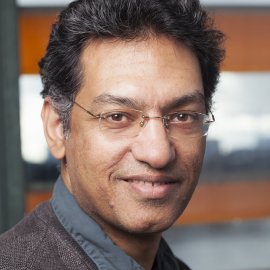History, University of Wisconsin-Madison, United-States

Janvier à Juin 2016
Viren Murthy was born in Chicago, Illinois, United States, but he returned to Bombay, India when he was young and attended High School there. He went to Lake Forest College and completed a Masters in Philosophy at the University of Hawaii at Manoa in 1992. He finished his doctorate in History at the University of Chicago in 2007. He was an assistant professor at the University of Ottawa from 2008 to 2012, before he moved to the Department of History at the University of Wisconsin at Madison, where he teaches at présent. His main areas of research include Chinese, Japanese and Indian intellectual history. His particular area of focus concerns critiques of capitalism and modernity. In this context, he is interested in postcolonialism and Marxism.
"Pan-Asianism and the Conundrums of Postcolonial Modernity"
This project asks how we should understand ideas about Asian unity and the critique of modernity or Western modernity throughout the twentieth century. The project is fundamentally interdisciplinary because the construction of Asia involves drawing on, among others, history, philosophy, and literary criticism. Literature, art, and philosophy, for example in the works of Tagore, Okakura, and Takeuchi, often serve to ground a romantic view of history and politics beyond the rational domination of Asia. Pan-Asianist-inspired historians, such as the Japanese historian of the 1940s and 1950s MIYAZAKI Ichisada or the contemporary Chinese intellectual historian WANG Hui, often constructed genealogical narratives of modernity in Asia that show its own inner logic, thus laying the foundation for taking a different path in the twentieth century. Such historians imagine Asia by bringing it into to the evolutionary grid of history while at the same time pluralizing ideas of the past and future. Therefore, in this mode of thought, we see attempts to rethink modernity, as they show Asian passages from the medieval to the modern period. This strategy overlaps with the contemporary idea of alternative modernities, but the politics of Asian modernity can entail radically different visions of what the alternative is. I contend that capitalism both forms the conditions for the possibility of such narratives of Asia, but at the same time, pan-Asianism attempts to go against its own conditions.
2014. Global Historical Thought, with P. Duara and A. Sartori (eds.), London: Blackwell.
2013. The Challenge of Linear Time: Nationhood and the Politics of History in East Asia, with A. Schneider (eds.), Leiden: Brill.
2012. « Transfiguring Modern Temporality: Zhang Taiyan’s Critique of Evolutionary History », Modern China, Vol. 38, No. 5, pp. 483-522.
2011. The Philosophy of Zhang Taiyan: The Resistance of Consciousness, Leiden: Brill.